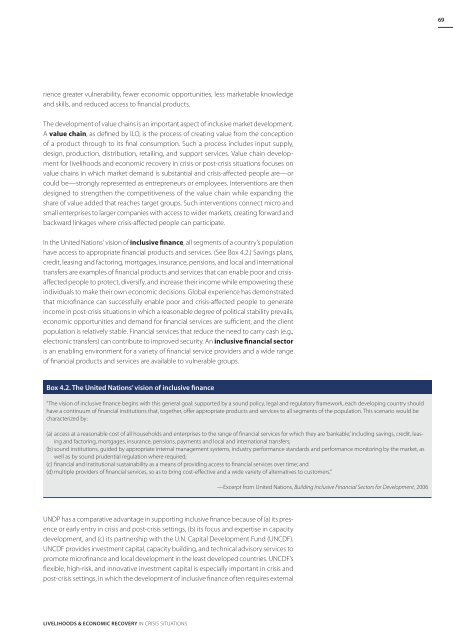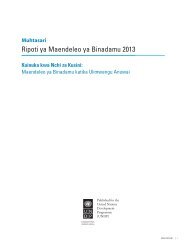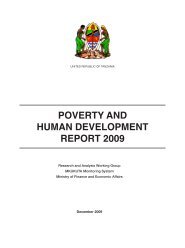Download PDF (4.08 MB) - ReliefWeb
Download PDF (4.08 MB) - ReliefWeb
Download PDF (4.08 MB) - ReliefWeb
You also want an ePaper? Increase the reach of your titles
YUMPU automatically turns print PDFs into web optimized ePapers that Google loves.
69<br />
rience greater vulnerability, fewer economic opportunities, less marketable knowledge<br />
and skills, and reduced access to financial products.<br />
The development of value chains is an important aspect of inclusive market development.<br />
A value chain, as defined by ILO, is the process of creating value from the conception<br />
of a product through to its final consumption. Such a process includes input supply,<br />
design, production, distribution, retailing, and support services. Value chain development<br />
for livelihoods and economic recovery in crisis or post-crisis situations focuses on<br />
value chains in which market demand is substantial and crisis-affected people are—or<br />
could be—strongly represented as entrepreneurs or employees. Interventions are then<br />
designed to strengthen the competitiveness of the value chain while expanding the<br />
share of value added that reaches target groups. Such interventions connect micro and<br />
small enterprises to larger companies with access to wider markets, creating forward and<br />
backward linkages where crisis-affected people can participate.<br />
In the United Nations’ vision of inclusive finance, all segments of a country’s population<br />
have access to appropriate financial products and services. (See Box 4.2.) Savings plans,<br />
credit, leasing and factoring, mortgages, insurance, pensions, and local and international<br />
transfers are examples of financial products and services that can enable poor and crisisaffected<br />
people to protect, diversify, and increase their income while empowering these<br />
individuals to make their own economic decisions. Global experience has demonstrated<br />
that microfinance can successfully enable poor and crisis-affected people to generate<br />
income in post-crisis situations in which a reasonable degree of political stability prevails,<br />
economic opportunities and demand for financial services are sufficient, and the client<br />
population is relatively stable. Financial services that reduce the need to carry cash (e.g.,<br />
electronic transfers) can contribute to improved security. An inclusive financial sector<br />
is an enabling environment for a variety of financial service providers and a wide range<br />
of financial products and services are available to vulnerable groups.<br />
Box 4.2. The United Nations’ vision of inclusive finance<br />
“The vision of inclusive finance begins with this general goal: supported by a sound policy, legal and regulatory framework, each developing country should<br />
have a continuum of financial institutions that, together, offer appropriate products and services to all segments of the population. This scenario would be<br />
characterized by:<br />
(a) access at a reasonable cost of all households and enterprises to the range of financial services for which they are ‘bankable,’ including savings, credit, leasing<br />
and factoring, mortgages, insurance, pensions, payments and local and international transfers;<br />
(b) sound institutions, guided by appropriate internal management systems, industry performance standards and performance monitoring by the market, as<br />
well as by sound prudential regulation where required;<br />
(c) financial and institutional sustainability as a means of providing access to financial services over time; and<br />
(d) multiple providers of financial services, so as to bring cost-effective and a wide variety of alternatives to customers.”<br />
—Excerpt from United Nations, Building Inclusive Financial Sectors for Development, 2006<br />
UNDP has a comparative advantage in supporting inclusive finance because of (a) its presence<br />
or early entry in crisis and post-crisis settings, (b) its focus and expertise in capacity<br />
development, and (c) its partnership with the U.N. Capital Development Fund (UNCDF).<br />
UNCDF provides investment capital, capacity building, and technical advisory services to<br />
promote microfinance and local development in the least developed countries. UNCDF’s<br />
flexible, high-risk, and innovative investment capital is especially important in crisis and<br />
post-crisis settings, in which the development of inclusive finance often requires external<br />
Livelihoods & Economic Recovery in Crisis Situations





